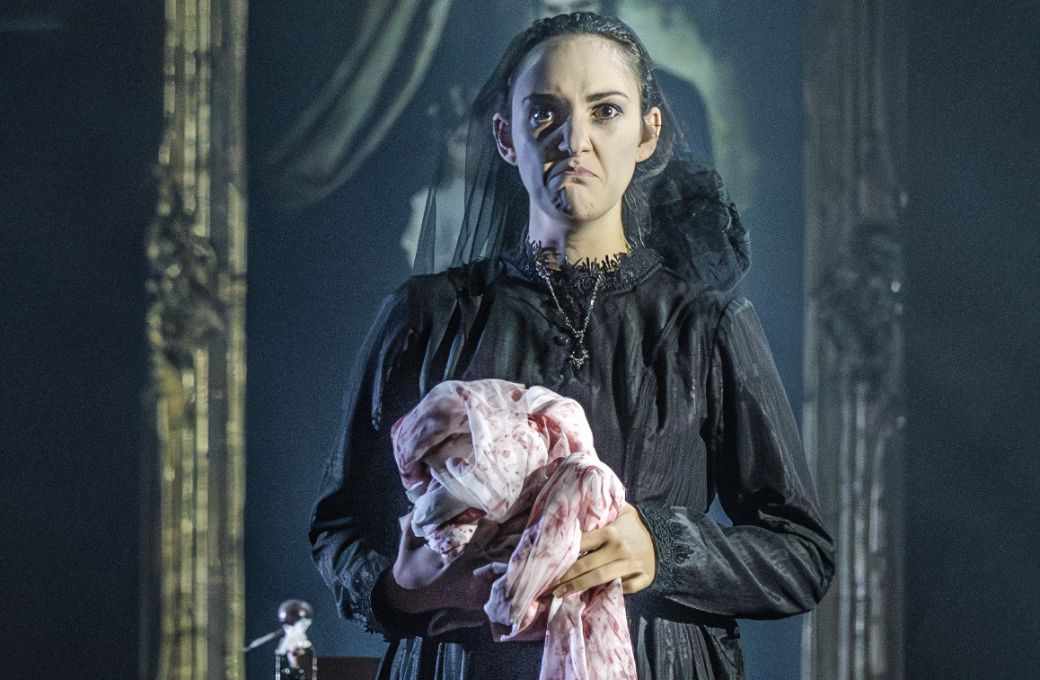Gothic Opera are in their sixth season, specialising in rare operas with Gothic and supernatural themes. Following on from staging Gounod’s La Nonne sanglante in 2021, they have moved on to Donizetti’s take on the same book, Matthew G Lewis’ The Monk. Maria de Rudenz premiered in 1838, but the performances were deemed a “fiasco” by Donizetti himself, and while it subsequently received some approval later, it pretty much dropped out of sight. Gothic Opera’s production is therefore the UK stage premiere. Worth it? Well, the music is as delightful and lyrical as one would expect from Donizetti and, on the basis of this production, it is certainly worth seeing in all its over-the-top Gothic glory.

Prior plot research was needed here, however, with no full synopsis in the programme, as the opera launches in necessitating some rapid backstory exposition. We learn that Corrado abandoned his lover, Maria, after they fled to Venice to escape her father’s disapproval. Corrado explains that he left her buried alive (he thought she had been unfaithful) – but it’s okay, he paid a guard to keep an eye on her! He returns to Rudenz Castle and proceeds to fall in love with Maria’s cousin, Matilde. But Maria returns from the dead and then, as they say, it all kicks off.
Battersea Arts Centre’s gloriously restored Grand Hall, with its bare, crumbling walls and latticed ceiling provided the perfect backdrop for this production, the stone arches at the back of the stage creating the ideal Gothic castle vibe. The production makes great use of the hall’s space, with a small stage area running down the central aisle, and action arriving from the rear and sides of the auditorium. Nate Gibson’s simple yet atmospheric set design and Luca Panetta’s lighting make excellent use of the space and the costumes are equally suitably stylish.
Being up close and personal to the singers made for a highly engaging performance; all performers excelled dramatically, drawing us into their heightened states of emotion. Of course, things turn on a sixpence, so one moment Maria and Corrado are on the brink of a reconciliation, then they both immediately flip to hatred and rejection – all the while, Donizetti providing delightfully lyrical melodies and often incongruously bouncy rhythms to accompany the high drama.
Anna Castro Grinstein conducted the six-piece band in Leon Haxby’s lean arrangement with energy and precision, with clarinettist Guillermo Ramasasa standing in (with support from the organ) for a full wind and brass section, alongside the string quartet. Sadly, part way into Act 2, the Grand Hall’s organ, which up until that point had added additional colour to the chamber orchestral sound, chose to malfunction. The insistent cipher brought proceedings to a halt, and the decision had to be taken to continue without the organ. All credit to the company for getting the show back on the road and, apart from a prominent organ solo that had to be delivered on an electric keyboard, the change was not too noticeable.
The whole setup is so deliciously Gothic and camp that it would be tempting to send it up with knowing comedy. To her credit, director Lysanne van Overbeek plays it straight, which made the cumulative over-the-top dramatic crescendo all the more effective. I even have to confess to a jump-scare moment when a blood-curdling scream announced a murder, albeit off-stage.
Across four performances, each solo role is being shared between two singers. For opening night, Theo Perry was darkly authoritative as Corrado, while also convincingly conflicted, and his rich baritone brought warmth to his duets with both Maria and Enrico. Tenor James Beddoe was equally convincing as Enrico, frustrated in his love for his brother’s fiancée, with bright tone, impressive range and admirable stamina. Soprano Alice Usher (also a Gothic Opera’s co-founder, alongside Béatrice de Larragoïti and Charlotte Osborn) delivered a beguilingly bewildered Matilde, and bass-baritone Harrison Gration’s Rambaldo injected warm calm amidst the chaotic drama. But soprano Daniella Sicari deserves the highest accolade for a stunningly powerful Maria, channelling true Gothic horror and steely control, with effortless coloratura throughout. As the plot unravelled, she became progressively unhinged, yet always in total control, a highly impressive performance.
The chorus, just six singers, produced a powerful sound together, and they were used well as characters, the two women having the only truly comic moment, when they fight over a bridal bouquet. The climax of Act 1, when the cast are singing at full pelt, spread across the stage and into the central aisle, was particularly stunning. Despite some loss of power after the organ went south, this was a production that nonetheless packed a hefty punch, refreshingly immediate and engaging throughout.


